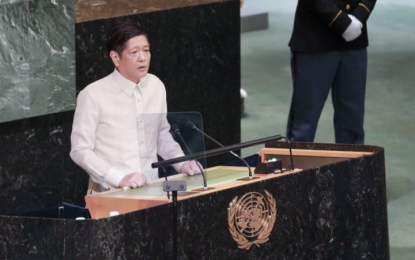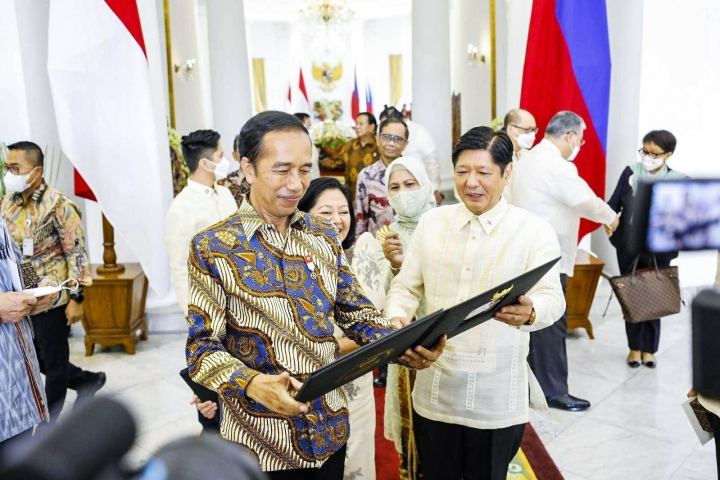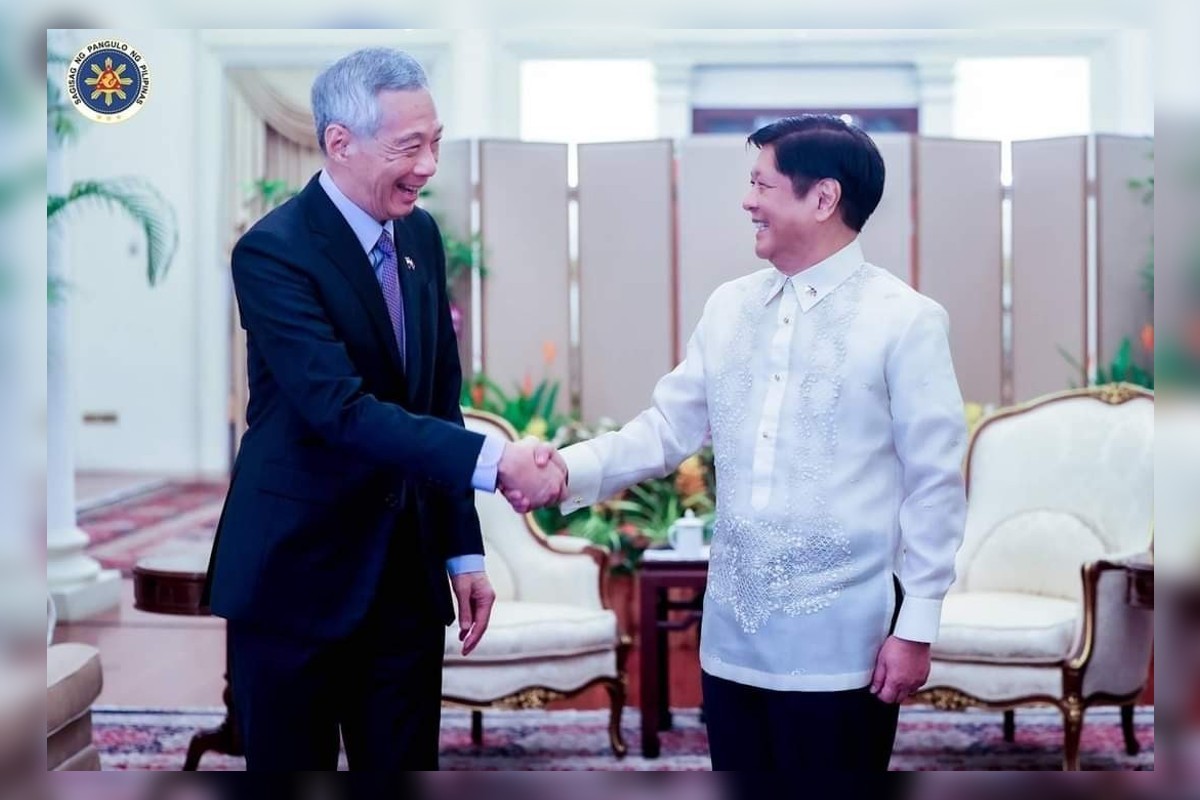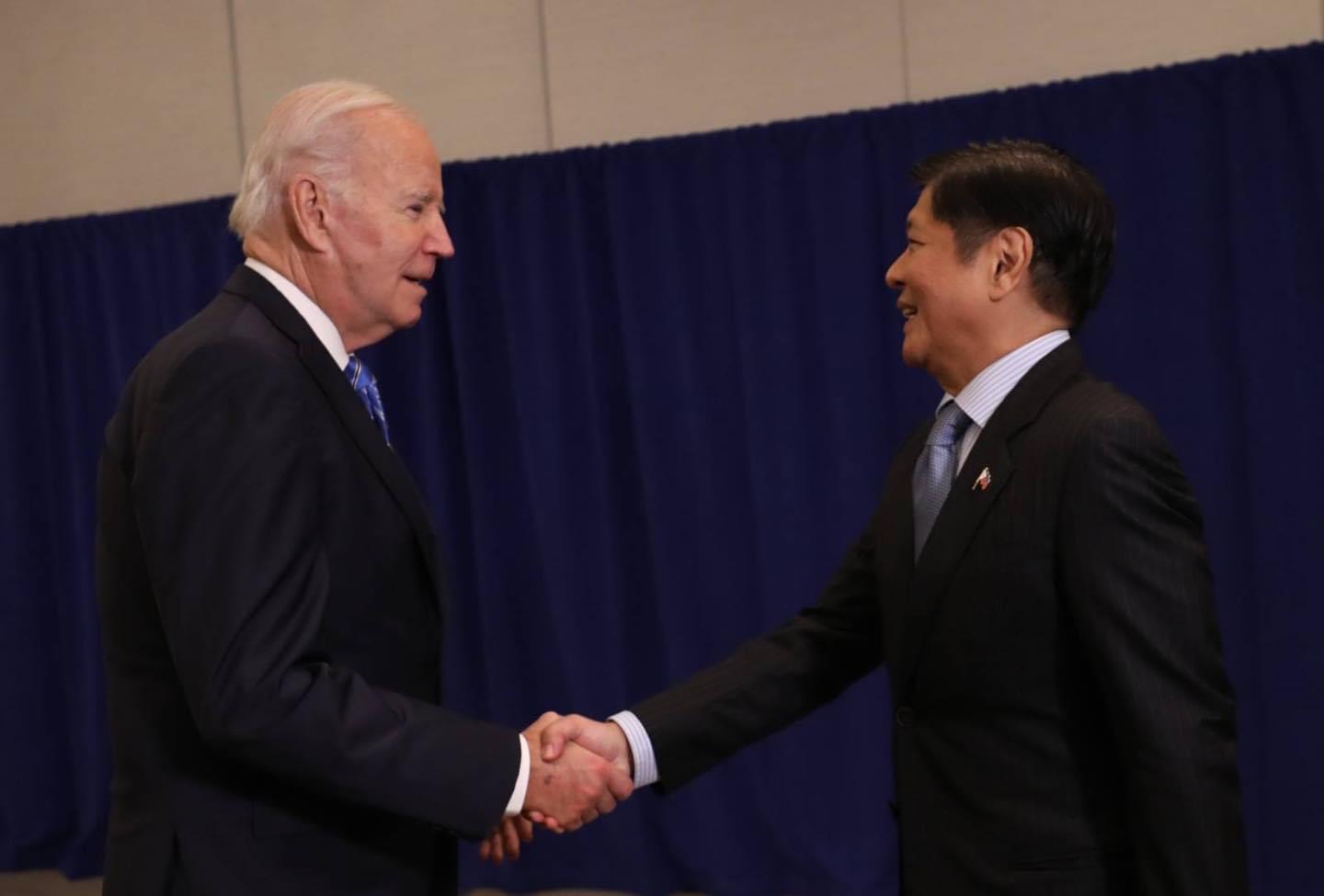
77th UNGA. President Ferdinand Marcos Jr. speaks before world leaders at the 77th United Nations General Assembly in New York on Sept. 21, 2022 (Philippine time). Marcos urged UN member-states to support the Philippines' candidacy to the international body's Security Council for the term 2027-2028. (OPS photo)
MANILA – In his first 100 days as president, Ferdinand “Bongbong” Marcos Jr. played the role of a “traveling salesman” by going on three foreign trips to lure foreign investors to do business in the Philippines.
The trips included state visits to two Southeast Asian neighbors namely Indonesia from Sept. 4 to 6; Singapore from Sept. 6 to 7; and a working visit to the United States (US) from Sept. 18 to 24.
He brought home business commitments amounting to USD18.92 billion (over PHP1 trillion) estimated to generate around 134,285 jobs.
Marcos, in his first State of the Nation Address on July 25, said the government will be working on making the Philippines an “investment destination” by capitalizing on the Corporate Recovery and Tax Incentives for Enterprises (CREATE) law and the economic liberalization laws such as the Public Service Act and the Foreign Investments Act.
Luring foreign investors to do business in the country, he said, would support the Philippines’ economic recovery efforts and create more jobs for Filipinos.
Throughout his trips, Marcos touted a “favorable” business climate in the Philippines, adding that its economic resurgence makes it the “smart” country to invest in.
Indonesia (Sept. 4-6, 2022)
Marcos’ inaugural trip to Indonesia, upon the invitation of Indonesian President Joko Widodo, was part of tradition where the first state visit of a new head of state is to a fellow member of the Association of Southeast Asian Nations (Asean).
The Philippines is one of five founding members of the Asean which was established in 1967 during the presidency of Marcos's late father, Ferdinand E. Marcos Sr.

Marcos brought home business commitments amounting to USD8.48 billion from his Indonesia trip, which is expected to generate 7,000 jobs.
Of the amount, the government secured USD7 billion in infrastructure for unsolicited private-public partnerships (PPPs) such as a C-5 4-level elevated expressway.
Marcos’ Indonesia trip also yielded USD822 million in investments in textiles, garments, renewable energy, satellite gateway, wire global technology, and agrifood and USD662 million in trade value for the supply of coal and fertilizer.
The Philippines and Indonesia governments also signed pacts on defense cooperation, cultural cooperation, creative economy, and a plan of action for bilateral cooperation.
Singapore (Sept. 6-7, 2022)
During his trip to Singapore upon the invitation of Singaporean President Halimah Yacob, Marcos and his wife, First Lady Liza Araneta-Marcos had new orchid hybrid, the Dendrobium Ferdinand Louise Marcos, named in their honor.
The Philippines secured USD6.54 billion worth of investment pledges during Marcos’ trip to Singapore, which is expected to generate 15,000 jobs.
On top of the list of Singaporean investments in the Philippines was an investment in electronic tricycles (e-trikes) valued at USD5 billion, followed by an investment in renewable energy, specifically the new technology of floating solar valued at USD1.2 billion.

The President’s Singapore trip also yielded a USD200 million investment to set up an in-country Data Center, which is expected to employ Filipinos, especially in the Information Technology (IT) and creative industry; an estimated USD10 million to USD100 million investment in areas such as marine renewable energy, water production, desalination, electric boats as well as aquaculture; a USD20 million investment on Innovation Platform for Start-Ups; and another USD20 million investment on Women in Technology.
He and Singaporean Prime Minister Lee Hsien Loong also witnessed the signing and exchange of agreements on the recruitment of healthcare workers, counterterrorism, personal data protection, digital cooperation, water resource management, and investment.
Marcos, on his second trip to Singapore on Oct. 2, reinforced the main talks during the last state visit there and continued to encourage investment in the Philippines.
US (Sept. 18-24, 2022)
Marcos made his debut on the international stage during his trip to the US, where he attended the 77th session of the United Nations General Assembly (UNGA) in New York. It was during the high-level debate where he vowed to retain his "friend to all, and an enemy of none" policy.
His trip to the US yielded USD3.9 billion worth of investment pledges, expected to create around 112,285 jobs.

These employment opportunities will come from different sectors such as Information Technology and Business Process Management (IT-BPM), data centers and manufacturing.
Other American companies had also expressed interest in considering new or further investments in the country, but their plans “have yet to be firmed up”, according to Malacañang.
Marcos also had multiple bilateral meetings with world leaders on the sidelines of the UN event.
In his bilateral meeting with US President Joe Biden in New York City, Marcos assured the former that the Philippines remains a "partner, ally, and friend" of the US.
He also cited the US’ role in maintaining peace, saying it is “something that is much appreciated by all the countries in the regions and the Philippines especially."
The two leaders also reflected on the importance of the Philippine-US alliance, according to the readout of the meeting released by the White House.
Biden also reaffirmed the US’ commitment to the defense of the Philippines.
Signed on Aug. 30, 1951, the Mutual Defense Treaty is an accord that stipulates that the Philippines and the US would support each other if either of them was to be attacked by an external party.
The two leaders discussed the situation in the South China Sea and underscored their support for freedom of navigation and overflight and the peaceful resolution of disputes.
Other topics discussed were opportunities to expand bilateral cooperation on a wide range of issues, including energy security, climate action, and infrastructure; Russia’s war against Ukraine and its implications for energy prices and food security; Asean matters; the crisis in Burma; and the importance of respect for human rights.
Other meetings
During the bilateral meeting between Marcos and Japanese Prime Minister Fumio Kishida, the two leaders vowed to continue bolstering Japan and the Philippines' cooperation to address security and economic challenges.

He also presented to Kishida his administration's priorities aimed at developing the agriculture, energy, infrastructure, and cybersecurity sectors.
Marcos also met with former United Kingdom (UK) Prime Minister Anthony Charles Lynton Blair to discuss global economic issues and peace-building initiatives in the Bangsamoro Autonomous Region in Muslim Mindanao (BARMM).
The two leaders also tackled ways to ensure food security, address climate change, and boost trade.
Following these trips, Marcos said he believes that now is the time to invest in the Philippines.
He also vowed to "swing the doors even wider" for high-value investments to create more jobs in the country, which he called "Asia's fastest rising economic star."
Earlier, Marcos expressed confidence that the Philippines would achieve upper middle-income status by next year.
At present, the Philippines is under the lower middle income category. (PNA)
